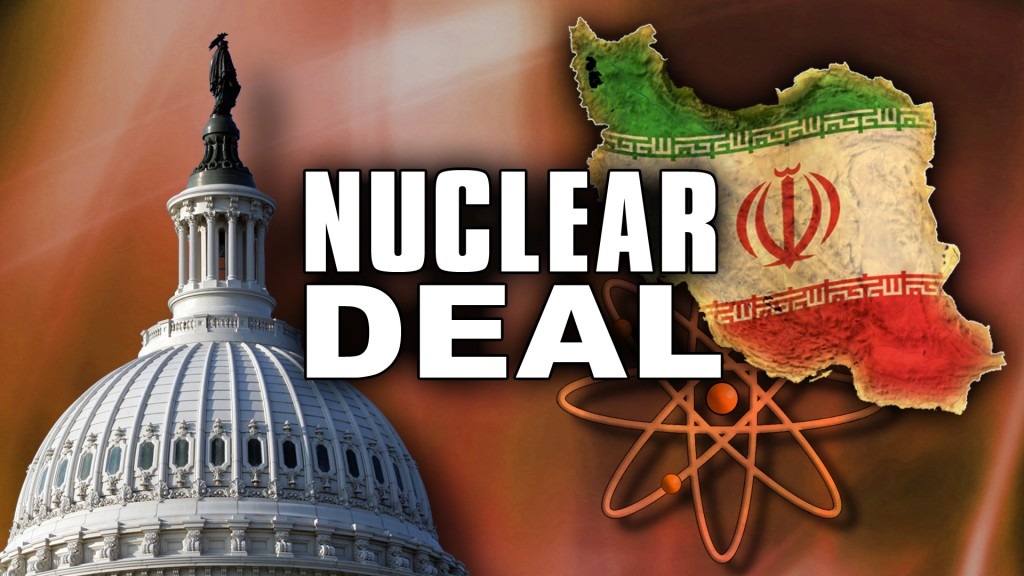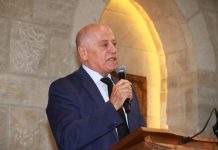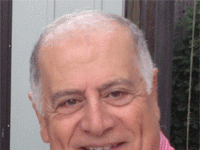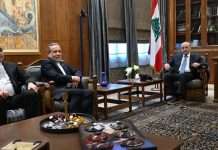US-Iran Nuclear Negotiations: Is Iran Now a Nuclear Power?
Colonel Charbel Barakat/May 24, 2025
المفوضات الأميركية – الإيرانية… هل وصلت إيران إلى السلاح النووي؟
الكولونيل شربل بركات/24 أيار/2025
يتابع المراقبون حول العالم مجرى المحادثات الأميركية – الإيرانية بعد الجولة الخامسة التي عقدت في روما أمس الجمعة، وقد لوحظ انسحاب المبعوث الأميركي ويتكوف منها قبل نهايتها، ما اعتبره البعض اشارة إلى عدم التقدم. ولكن لم يصدر عن الوفد الأميركي أي تصريح بهذا الشأن، ولا علّق الوفد الإيراني على الموضوع. وقد صرّح وزير خارجية عمان بأن هناك “تقدم بدون حسم” وهو كلام ديبلوماسي لا يدل على التوصل إلى أي تفاهم يمكن البناء عليه ولا إلى توقفها، فلم يعلن أي من الطرفين نهاية المفاوضات.
ولكن تصريح وزير خارجية الولايات المتحدة أمام لجنة العلاقات الخارجية في مجلس الشيوخ الثلاثاء الماضي؛ بأنه لا يمكن لطهران تخصيب اليورانيوم محليا، وأذا كانت تريد استمرار برنامحها النووي السلمي فإنها يجب أن تعتمد على التزود باليورانيوم المخصّب بحسب التركيز المسموح به من دول أخرى. ولكن رد طهران جاء على لسان الامام الخامنئي نفسه فورا، إذ شدد على أن حق إيران بالتخصيب لن يحرمها منه أحد. ومن الملاحظ بأن الكلام على الشروط الأميركية حول الصواريخ البالستية والأذرع الإيرانية لم يعد مطروحا، ولا يعني ذلك أن الولايات المتحدة قد قبلت به، ولكنها على ما يبدو تفضّل الانتهاء من كل نقطة على حدى، ومن ثم بعد الاتفاق عليها تنتقل إلى النقطة الثانية ولم تنته بعد من نقطة التخصيب.
الرئيس ترامب كان يبدو مستعجلا في انهاء تجربة التفاوض مع الإيرانيين الذين يمتازون بولعهم بالمساومة، ومن هنا محاولة الأميركيين التركيز على موضوع التخصيب والانتهاء منه قبل مناقشة إي شأن آخر، وذلك ربما بسبب امتلاكهم معلومات حول توصّل إيران إلى العتبة العسكرية. ولكن ماذا تريد طهران بالفعل؟ ولماذا قبلت بالتفاوض وهي تعلم بأن الرئيس ترامب له أهداف واضحة بالنسبة لقدرتها للتوصل إلى امتلاك سلاح نووي يهدد استقرار المنطقة التي تعتبر مصدر الطاقة العالمي؟
يقول وزير الخارجية الإيراني السيد عرقجي اليوم بأن بلاده لا يمكن أن تقبل بالتخلي عن التخصيب سيما وقد استثمرت الكثير من الأموال في هذا المشروع، وهي اليوم قادرة على التخصيب إلى أعلى المستويات ضمن حدودها الجغرافية، لا بل وعلى امتلاك السلاح النووي، ولكنها لا ترغب بذلك، وستدافع عن هذا الحق ولن تتخلى عنه. هذا الكلام يؤكد مخاوف الرئيس ترامب والجيران في بلدان الشرق الأوسط، من دول الخليج العربي إلى دولة اسرائيل وغيرها. فما كان يخافه البعض ها نحن وصلنا إليه، وقد اعترف وزير الخارجية به علانية، وهو ما كان يدور حوله كافة المفاوضون الإيرانيون، منذ رفسنجاني إلى خاتمي إلى روحاني وانتهاء بظريف، والكل كان يحاول كسب الوقت لكي يتمكن العلماء العاملون في البرنامج النووي للتوصل إلى مستوى التخصيب الذي يسمح لهم بعسكرة المشروع، وعندها تصبح إيران دولة نووية تفرض شروطها على المجتمع الدولي كأمر واقع.
فهل ينتظر العالم موجة من الصدام العسكري؟ وهل تجرؤ اسرائيل على القيام بضرب المنشآت النووية الإيرانية وحدها؟ وهل إن الولايات المتحدة وصلت إلى الطريق المسدود عبر التفاوض وسوف تتخلى عنه؟ وهل سنرى تصعيدا دوليا باتجاه تجريد طهران بالقوة من برنامجها النووي؟ وهل أن النظام الذي تميّز بالتقية يمتلك ما يمكنه أن يؤذي من يتجرأ عليه؟
أسئلة لا بد أن تطرح في زمن المواجهات الكبرى وقبل الدخول إلى عصر السلام الطويل، الذي يحاول الكل العبور صوبه بأقل الخسائر الممكنة. لا بل ففي استعراض سريع لمجريات الأمور نجد بأن فريق طهران أو ما كان يسمى “محور المقاومة”، والذي ضم سوريا ولبنان واليمن والعراقي وغزة في فلسطين وتناغم مع روسيا والصين، عارضا نفسه كقوة أقليمية لا بد من الاتفاق معها حول كافة المشاريع المستقبلية للمنطقة، فقد على التوالي حماس وسوريا الأسد وحزب الله اللبناني وبعض قدرات حوثيي اليمن في السيطرة على المنافذ البحرية، وهو يتهاوى حتى في العراق، فكيف به إذا ما تلقى ضربة قاضية بحجم التخلص من برنامجه النووي وقدراته العسكرية على كافة المستويات البحرية والصاروخية والتخريبية والمخابراتية، وحتى جنون امتلاكه قدرات نووية صغيرة قد تكون مسروقة من مخلفات الاتحاد السوفياتي أو مصنّعة حديثا قيد التجارب؟
الأيام القادمة لا بد ستحمل أجوبة على هذه التساؤلات ولا بد للمواطنين في دول الشرق الأوسط من وضع أيديهم على قلوبهم والدعاء أن يخفف الله من قساوة الآتي، ويعطي الحكام بعض الحكمة وحسن التصرف للعبور إلى عصر السلام باقل أضرار ممكنة. فالإرانيون أنفسهم سئموا من دولة الملالي التي تحكمهم بالحديد والنار، فكيف باللبنانيين وما تبقى من الفلسطينيين الذي لم يتمكنوا بعد وبالرغم من كل الخسائر بالأرواح والعمران من دفع حماس وجماعتها لتسليم أسلحتهم والرهائن والاعتراف بالهزيمة للمضي في بناء مستقبل لهذا الشعب المحكوم بطغمة من القتلة يتاجرون بدمه في سبيل ديكتاتوريي الشرق وطروحاتهم بخلق الأعداء لتغطية مساوئ حكمهم منذ الناصريين إلى البعثثين وصولا إلى الخمينيين وغيرهم من الطغاة وكلهم يحمّلون ذنوبهم لازمة “العدو الصهيوني” الذي يبدو بأنه لا يمانع من المصير المفروض عليه في هذا الشرق الذي كتب عليه العذاب.
US-Iran Nuclear Negotiations: Is Iran Now a Nuclear Power?
Colonel Charbel Barakat/May 24, 2025
Global observers are closely monitoring the trajectory of US-Iranian negotiations, especially after the fifth round of talks held in Rome on Friday May 23/2025. The unexpected and premature departure of U.S. envoy Whitkov was widely noted, sparking speculation that the discussions may have hit a roadblock. However, neither the U.S. delegation nor their Iranian counterparts issued any public statements. Oman’s foreign minister offered only a cautious remark about “inconclusive progress” — a diplomatic phrase that suggests the talks remain unresolved, without signaling a complete breakdown. Notably, neither side has officially declared the dialogue over.
Adding a layer of complexity, the U.S. Secretary of State informed the Senate Foreign Relations Committee on Tuesday that Iran must not be allowed to enrich uranium domestically. He emphasized that if Tehran seeks to maintain a peaceful nuclear program, it must rely on externally supplied enriched uranium, limited to internationally acceptable levels. This position was swiftly rejected by Iran’s Supreme Leader, Ayatollah Khamenei, who declared Iran’s right to enrich uranium as non-negotiable.
Meanwhile, issues such as Iran’s ballistic missile development and support for regional proxies have seemingly faded from the spotlight. This does not necessarily reflect U.S. acquiescence to these threats, but rather suggests a strategic decision to address issues sequentially — with uranium enrichment taking precedence. Under President Trump, known for his impatience with Tehran’s negotiating tactics, this prioritization may point to intelligence assessments indicating that Iran is approaching the nuclear threshold.
The core question remains: What are Tehran’s true objectives? Why did Iran agree to resume negotiations — particularly with President Trump at the helm — when the primary U.S. concern is Iran’s potential nuclear weaponization, a development that would gravely destabilize the oil-rich region?
On Friday, Iranian Foreign Minister Arakji reiterated that Iran will not surrender its enrichment capabilities, citing massive state investments in the program. He claimed Iran now possesses the ability to enrich uranium to weapons-grade levels and even build nuclear weapons — though he insisted they have no intention of doing so. He stressed that Iran will defend this capability at all costs. These statements confirm the fears voiced by President Trump and many of Iran’s neighbors, from the Gulf Arab states to Israel. The long-feared scenario — an open declaration of weapons-grade enrichment capability — now appears to be reality.
This echoes the strategy pursued by earlier Iranian negotiators, from Rafsanjani to Rouhani and Zarif, who were widely believed to have used diplomacy as a cover to buy time for Iranian scientists to advance enrichment efforts. Their ultimate goal: to position Iran as a de facto nuclear power, capable of imposing its terms on the international community.
These developments raise urgent questions:
Is the world on the brink of another major military confrontation?
Will Israel consider unilateral military action to neutralize Iran’s nuclear infrastructure?
Has the United States reached a diplomatic dead end?
Could there be a global push for the forceful dismantling of Iran’s nuclear program?
And does the Iranian regime — long known for its practice of taqiyya (religious dissimulation) — possess hidden nuclear or military capabilities capable of inflicting grave harm on its adversaries?
These questions demand urgent answers at this critical juncture, before the world either slides into confrontation or successfully navigates toward an era of stability — one that all parties claim to desire, albeit on very different terms.
A brief review of the geopolitical landscape reveals that Iran’s so-called “axis of resistance” — spanning Syria, Lebanon, Iraq, Yemen, and Gaza — is presenting itself as a pivotal regional force, bolstered by alliances with Russia and China. Yet this axis may be weakening. The influence of Hamas, Assad’s regime, Hezbollah, and the Houthi rebels appears to be waning — and similarly in Iraq. This could indicate not only a decline in Iranian regional clout but also a moment of opportunity for the international community to challenge Tehran’s nuclear and military ambitions more decisively.
Yet serious questions remain about whether Iran would ever agree to give up its nuclear capabilities — whether overt or covert — including potential small nuclear devices acquired from Soviet-era stockpiles or developed through secret testing. Iran’s ballistic missile arsenal, naval capabilities, cyber warfare programs, and covert intelligence networks remain deeply entrenched and dangerous.
The coming days are crucial. They must provide clarity on these pressing issues. Citizens across the Middle East are watching nervously, many praying for divine intervention to avert disaster, and for their leaders to act with wisdom in steering the region toward peace with minimal losses.
Inside Iran, there are growing signs of public fatigue with the clerical regime’s rigid and authoritarian grip. That sentiment is echoed — and perhaps intensified — in Lebanon and among Palestinians, where years of conflict and devastation have failed to break the stranglehold of armed factions like Hamas and Hezbollah. These groups continue to refuse disarmament, reject accountability, and cling to narratives of resistance that have cost their people dearly. In doing so, they serve the interests of Eastern dictatorships that exploit regional instability and manufacture external enemies — from Nasserism to Baathism to Khomeinism — all while sacrificing their own populations at the altar of ideological tyranny and anti-Zionist propaganda.
Colonel Charbel Barakat
***Colonel Charbel Barakat, a retired Lebanese Army officer, historian, terrorism expert, and author of numerous works on Lebanon, the Iranian regime’s schemes, and jihadist movements, has testified multiple times before the U.S. Congress on critical issues, including Iranian and Syrian terrorism, the Syrian occupation of Lebanon, jihadist threats, and the pursuit of Middle East peace.






















